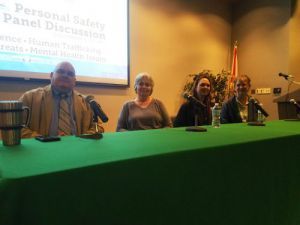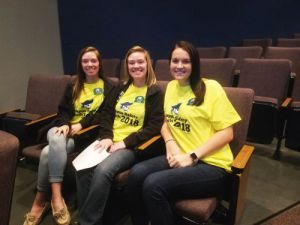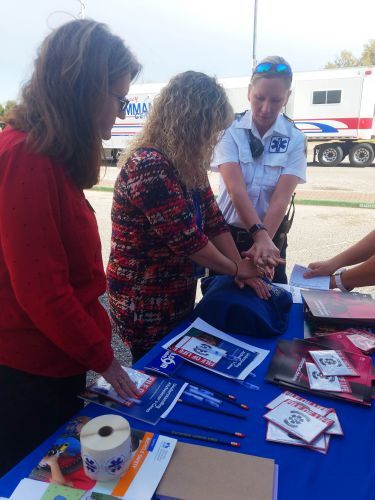“What can we do to keep our schools safe?” The answers are varied, but the one thing that remains constant is the need to be prepared for the unexpected.
That is what Pensacola State College’s second annual Campus Safety Month was all about.
Beginning March 1 with a Safety Month Kickoff and Law Enforcement Panel, daily events followed including workshops, trainings, discussions and demonstrations designed to foster safety awareness. A “Safety Day” was held on each campus with representatives from local police and fire departments, the American Red Cross, Escambia County Emergency Management Agency, the Arrive Alive Tour Drunk & Distracted Driving Simulator, and Lakeview Center’s SHAPE (Substance-abuse, HIV Assessment & Prevention Education) on hand. Free food, T-shirts and other giveaways were a big hit as well.
A variety of safety-related topics were covered including cybersecurity, identity theft and interacting with law enforcement. First aid seminars provided AED and CPR training and self-defense classes included instruction in Krav Maga (“Contact Combat,”), R.A.D. (Rape Aggression Defense) training for women and active shooter training.
Safety Month wrapped up on March 22 with a Personal Safety Panel that featured experts on mental health, domestic violence, human trafficking and social media threats. Following a brief presentation on each topic, audience members participated in a question-and-answer session with panelists.
Liz Moseley, who is known as “Dr. Liz” on the Pensacola campus, said most people with mental health issues are aware they have a problem, but don’t always know where to turn. As an adviser to the Active Minds Club and a Gatekeeper Suicide Prevention trainer, she said 1 in 4 people will deal with some type of mental health issue in their lifetime.
“Parents can model good mental health to children by creating a family culture where wellness is important and giving children the freedom to talk about their feelings without judgement,” she explained.
A crisis text line also is available by texting “Help” to 741741.
“‘I believe you,’ is the most important thing you can say to someone who is experiencing physical or emotional abuse,” according to Julia Hoeschler, an outreach counselor and advocate for Favor House.
With the largest population of domestic abuse victims ranging in age from 16 to 24, Hoeschler stressed the importance of recognizing the signs in a campus community: isolation, depression, making excuses for the abuser, hiding physical evidence and witnessing the abuse.
“The effects are long-lasting and may include issues with physical and mental health, suicide or homicide,” she said. “Providing a support system, leading a person to the right resources that can help them and encouraging them to reach out to professionals are all things you can do to help someone in this situation.”
Donna Parish, a Northwest Florida human trafficking and missing child specialist, said in 2017, there were approximately 150 human trafficking investigations in the region, with about 50 of those being in Escambia County.
“People don’t realize what’s happening right here in our own backyard,” Parish said. “Trafficking is not always a ‘kidnapping’ scenario and is more correctly defined as exchanging something of value for sex. Juveniles may traffic themselves, sometimes there’s a ‘Romeo’ who sweeps them off of their feet or a ‘Gorilla Pimp’ who is violent and forceful and sometimes families traffic their own children.”
If you suspect that someone is a victim of human trafficking, Parish encouraged attendees to contact local law enforcement.
“When you call the police, it empowers them to resolve the issue,” she added.
Chris Wilkinson, who served in the computer crimes division at Pensacola Police Department before retiring, discussed the dangers of online predators and the risks of social media.
“I tell people to think of their computer as being as dangerous as a loaded gun,” he said.
In addition to being prepared to handle any situation that arises, the college’s Public Safety officers depend on students and employees to be their eyes and ears and alert law officers to potentially dangerous incidents.
The direct line to the Campus Public Safety office for assistance on all campuses is (850) 484-2500. For immediate assistance in an emergency, call 911.
Plans are in the works for future Campus Safety Month events. If you are interested in serving as a committee member, contact Lynsey Listau at (850) 484-2128.



 PirateQ
PirateQ 
